
What is a Superfood?
The concept of a “superfood” might sound simple – a food that’s really good for your health. But in practice, the term has no scientific or regulated definition, so it is open to interpretation – and sometimes abuse.
Dr Chris Van Tulleken propelled ultra-processed foods, or “UPFs”, from a mainly ‘academic’ description into a household term with his book ‘Ultra Processed People’, in which he describes how eating a diet of only ultra-processed foods left him feeling 10 years older and 7kg heavier in just four weeks.
Concerningly, a study published in the British Medical Journal revealed that the average diet for someone in a high income country is over 50 per cent ultra-processed foods – and even more worryingly, our children are becoming deeply used to ultra-processed foods being the norm.
So ultra-processed foods are common and considered dangerous – but how well do we really understand this new trend? Join us as we explore what ‘ultra-processed’ actually means, why and how ultra-processed foods are bad for us, and how we can protect our health in an ultra-processed culture.
Researchers at the University of São Paulo, Brazil coined the term ‘ultra-processed foods’ in 2009 when they created the NOVA food classification system. The system places food into one of four categories:
This includes whole produce such as fruit & vegetables, milk, eggs, meat & fish, or nuts and seeds. These foods have no added ingredients and are little altered from their natural state (for example, vegetables might be chopped or peeled).
This includes things like oils, salt and sugar, which are refined forms that wouldn’t be found this way in nature. They are usually added to other foods, often during the cooking process, rather than eaten by themselves.
These are a combination of foods from groups 1 and 2 (above) that are only altered in a way that home cooks themselves could do. Examples would include pickles, jams, tinned fruit and vegetables, bakery-made bread and cheeses.
These foods typically have lots of ingredients (five or more) and contain additives that are artificial or not typically used in home cooking (such as preservatives, emulsifiers, sweeteners, or artificial colours and flavours). This is often done to improve their taste or texture, or to give foods a long shelf life.
Foods may also be considered ultra-processed if they have had lots of their original goodness removed during processing, such as in white bread and pasta, which include far less fibre than their wholemeal counterparts. This applies to ingredients too: for example, maltodextrin is a highly processed form of starch, made from corn, rice or wheat – but it is considered ultra-processed because it has been so heavily modified from its natural state.
For more examples, check out the BBC’s guide to ultra-processed foods here.
A recent study in the British Medical Journal, which looked at data from almost 10 million people worldwide, illustrates the issue perfectly. It found that people who ate lots of ultra-processed foods were more likely to die from cardiovascular illnesses (such as a heart attack or stroke); be obese; develop type 2 diabetes; and suffer from sleep disorders; anxiety and depression. However, the study couldn’t determine whether it was the processing of food that was the culprit, or whether it was simply that ultra-processed foods were more like to be unhealthy due to being high in fat, sugar and salt.
The challenge is that ‘ultra-processed foods’ is a very broad category that is more focused on how a food was made than what went into it. So while crisps and cake are all clearly bad for our health, what about a green powder blend? Health foods like these are often a carefully-designed blend of as many as 20 different ingredients, but remain an entirely nutritious and health-boosting option despite the long ingredients list.
Despite some confusion around the term itself, it’s clear that many highly processed convenience/fast foods are clearly bad for our health. But why? There are three key reasons why these artificial foods undermine our health goals:
Many ultra-processed foods are simply bad for us because they have a poor nutritional profile, with high levels of fat, sugar and salt and little actually beneficial nutrition. High fat and sugar foods can contribute to putting on weight and developing diabetes, while eating lots of high salt foods can lead to developing high blood pressure.
The sugar, fat and salt in ultra-processed foods make us crave more of them, and they often don’t contain much dietary fibre, making them unsatisfying and quickly digested. Together, this leads us to eat far more of them that we might of their whole-food equivalents – for example, no-one would eat 5kg of baked potatoes, but a Big Mac contains roughly the same number of calories (~500).
The jury is still out on whether the artificial sweeteners, preservatives and other added chemicals often found in UPFs are actively bad for our health. However, most people agree that it’s at least possible that these artificial ingredients could be undermining our health, and that it might be worth avoiding eating too many of them if we can.
These factors mean there are all kinds of ways that ultra-processed foods can undermine our health, from raising our blood sugar and blood pressure to introducing toxins to our bodies. But perhaps the biggest impact of ultra-processed foods has been how easily they can lead to us putting on weight.
In 1980, around 7% of people in England were obese. Today this statistic stands at 25%, or‘one in 4’– and the rise in obesity very closely follows to the rise in popularity and availability of high-sugar, high-fat ultra-processed foods. Far from being a coincidence, it’s likely that big food manufacturers have played a critical role in the widespread challenges with weight that we now see across the western world.
The ultra-processed movement has drawn people’s attention onto the food they’re eating. For example, while ‘junk food’ has always been clearly bad for us, artificially sweetened yoghurts or breads – which might seem healthy at first glance but are actually packed with added sugar, emulsifiers and preservatives – are not such an easy spot. So as a rule of thumb, looking for and being sceptical of ultra-processed foods is a great shortcut for making your diet healthier.
But processing can sometimes work for the good guys too. For example, breakfast cereals and bread made in the UK often have added ingredients designed to boost our health, including essential vitamins (such as vitamin D or folic acid) in which much of the UK population is deficient.
While these added ingredients technically do make these foods ‘more processed’, they actually improve the food’s nutritional profile. To try and square this circle, food producers have developed the term ‘clean label’. Clean label foods are those that do not contain any chemicals, colourings, preservatives, artificial flavours or sweeteners, and have not been adulterated with added sugar, salt or fats which might improve their taste but would undermine our health.
While the term ‘clean label’ is not regulated by any particular organisation, it can be useful – for example, in helping us to identify when a food producer has actively removed added nasties from their products. However, it’s also not a perfect solution, as it doesn’t consider what’s been removed from a food during processing, and so wouldn’t help you choose wholemeal bread or pasta (which is packed with fibre) over the white alternatives, which are bad for your gut and will spike your blood sugar.
Here at SmarterNaturally we believe ultra-processed foods are playing a significant role in undermining our health. That’s why all our products are ‘clean label’, meaning they are produced with a strong focus on using only natural and healthy ingredients; are low in fat, salt and sugar; and are instead packed full of natural sources of vitamins, minerals and dietary fibre – as well as the powerful natural active ingredients that make our super-broccoli so special.
We’re proud to see this effort paying off, with our SuperSoup scoring an impressive 89 on the Zoe health scale – indicating it can be “eaten freely” and is “good” for blood sugar, blood fat and gut health.
(For those not in the know, the Zoe programme, co-founded by Professor Tim Spector, a professor of genetic epidemiology at King’s College London, is a personalised nutrition app that tracks your own body’s specific food preferences, taking personalised nutrition to the next level. The Zoe scale is a rigorous and strict assessment of a product’s impacts on your health, so we’re delighted to see our SuperSoup scoring so highly.)
This commitment to clean-label products means we can contribute to the nation’s health getting better, rather than worse. As recently stated on Instagram by Professor Tim Spector himself: “There is a big difference between ultra-processed foods, which may be damaging our health, and processed foods which can help with healthy eating in our busy lives.”
Optimise your performance, endurance and recovery with our raw GRextra powder – made from our super-broccoli to give you an edge.
Add a scoop to your favourite smoothie or shake during training and both before and after race day to train your metabolic fitness, unlock improved performance and endurance, and support recovery.
-> Learn more

The concept of a “superfood” might sound simple – a food that’s really good for your health. But in practice, the term has no scientific or regulated definition, so it is open to interpretation – and sometimes abuse.

TV chef, presenter, former Masterchef contestant, award winning author, and SmarterNaturally’s in-house recipe wizard Theo Michaels shares his story and reveals why he teamed up with us in this exclusive interview.

Surviving a health scare is a huge relief, but what comes next often goes unspoken: the challenge of reclaiming your health and getting back to your best.

